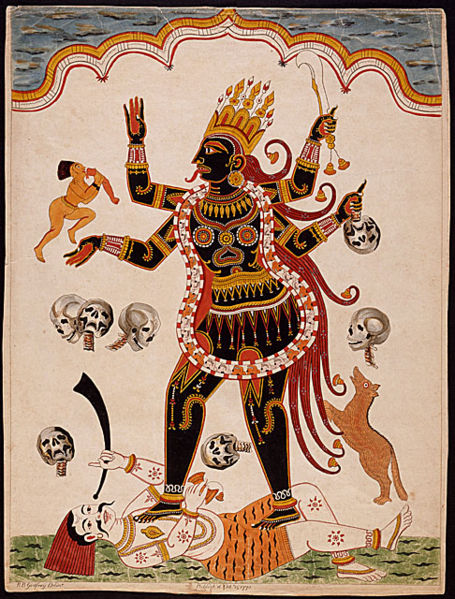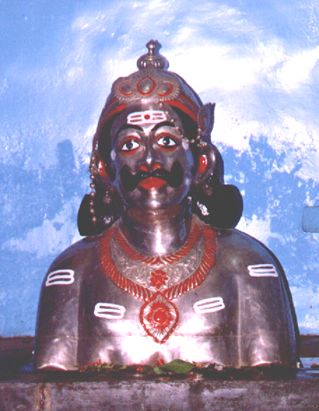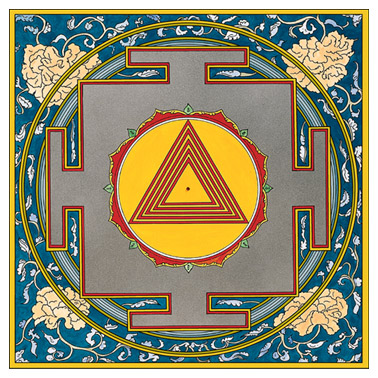
Demons
Sanatana Dharma's
conception of "demons" is a
little if not too different from the Christian
one. Christianity associates the fate of bad souls with
Satan, but if you ask why Lucifer then harms souls that
served him all their lives (why are they not happy in hell then?),
Christians have difficulties to answer this properly. Yama
as a Vedic god is only a judge of the deceased without any connotations
that he might serve the evil one (Satan).
The Christian conception is to denote anything that
differs from the "prescribed" monolithic explanation of
the Bible as something "satanic". In this sense, tantra
(as sexual spirituality) is purely seen as a demonic form of devotion
from the Christian point of view; however, I said that Sanatana Dharma's
conception differs also a little from the Christian one because
both concepts look principally equally at the Final Architecture
(goal) for this planet and its people.
The word "demon" or "daemon"
was not thusly one-sided in the ancient past as it is today. Plato,
too, writes about "demons" without associating them to something
bad. Demons are known in Islam, too. The term "jinn"
originally meant anything that could be "hidden" - something
"secret", "remote", or "invisible".
In Islam, bad "jinns" are called shaya-ti-n (not
really "demons") and Iblis (Satan) is their leader.
Andhaka
Andhaka was the third son of Lord Shiva, but Shiva
killed him. Andhaka was born of Shiva's tear, but Andhaka angered
Shiva with his (sexual) lust to Parvati.
Bhuta
This is a homonym; on the one hand, it means five
elements: Akasha (ether), Vayu (wind), Agni
(fire), Prithvi (earth), Ap (water). On
the other hand, Bhuta is a kind of a bad soul
of a human being who died tragically, either by suicide or
by execution.
Kali 
1) Kali is an angry form of
Shakti (Shiva's consort). Here the statement that Kali is a
demon is only correct if the word "demon" is understood
in its ancient touch. Her fierce depictions are only based upon Her
need to fight against desires of one's ego. She is misunderstood by
Europeans and Americans and Her "demonic" attributes are
artificially given to Her by people from other cultures. She is not
a demon and She does not belong to this section. However, people from
other cultures see this form of Goddess as "demonic" and
She is included here only with purpose to invalidate this prejudice.
Her possible deformation also comes from India from a cult of thugees,
which were originally Muslims, but some scholars say that British
colonists blew up the whole story with purpose to excuse their military
operations.
2) Kali is a homonym (Kali:
Goddess; Kali: real demon), thus
"Kali" is also the demon of Kali Yuga. However, the
word "homonym" is not quite accurate here, as Sanskrit differentiates
both words (Kali - the Goddess KAALII, and Kali - the demon KALI)
with accent (double vowels like you see in the word KAALII imply that
the vowel "A" requires an accent like the English word "are").
In case English does not differentiate both words with their natural
accent, then we can say that Kali (Goddess) and Kali (demon) are homonyms.
Koka and Vikoka
These twins are Kali's (Goddess Kali has nothing
to do with these twins) generals who instigate wars and evil things.
Panis
Panis represents a class of demons.
Pishacha
These are carnivorous demons; their origin is not
clear.
Rakshasas
A race of evil mythological
beings (man-eaters), but living in solitary places. Rakshasas are
mentioned in a number of Puranic books and the Mahabharata too.
Vetala
This demon is a kind of a vampire. "Vetala"
are spirits that live in dead bodies.
Vinayakas
Vinayakas are a group of four troublesome demons
who create obstacles, but we can easily cope with them.
In the Puranic literature of a much later period,
the group of four Vinayakas was merged into one deity named Vinayaka
whom Rudra (Shiva) appointed as the "Leader of the Ganas".
Vipracitti
Chief of the Danavas (analogical
to Greek Titans) - a powerful race of giants almost always at war
with gods. Kasyapa’s (Kasyapa was the grandson of Lord
Brahma) wife Danu (a daughter of Daksha) had many sons and the
word "Danavas" is derived from her name.
Virabhadra
Virabhadra is a patron of occult practices. He has
temples, too. One of such temples is, for example, in Mylapore (a
southern part of Chennai in the Indian state of Tamil Nadu). Shiva
created him to help Him fight with Daksha.
Conclusion
In the Hindu mythology, there are many demons. People
governed by such evil entities are demons too, or even people who
diverted from the good order in spite of being born in a Brahmin family.
Back


